If symptoms
persist . . .
WHEN your doctor gives you a prescrip- tion, it must be a comfort to know that his scientific training and profound know- ledge of pharmacology have enabled him to reach a wholly rational decision about which medicine to give you.
I'm afraid things are slightly different in practice. I don't want to alarm you unduly, or destroy your confidence in your medical adviser of a quarter of a century, but in all probability he chooses the medicine he prescribes for you in much the same way as housewives choose washing-up liquid. Perhaps this is inevit- able in a world in which the quantity of medical research rises inexorably: para- phrasing Malthus, one might say that medical knowledge in the abstract in- creases geometrically, while individual doctors' knowledge increases only arith- metically (when it does not actually de- crease). By the year 2030, the earth's surface will be covered up to a depth of seven feet in medical iournals.
Not least among the latter will be the free glossy newspapers — such as Pulse, Doctor and GP — that arrive relentlessly through the letter-box of every doctor in the land. It is from the splendid advertise- ments which these contain that many of us learn about new, improved drugs. Taking one of these publications at ran- dom, what do we find? A reindeer with a red nose (advertising a cure for hay fever); a lady who looks like a columnist for an up-market women's magazine (post-menopausal symptoms); a seduc- tive pair of female lips about to swallow a sky-blue capsule (vaginal thrush); a small waterfall (a diuretic for oedema); the crater of a volcano, both erupting and dormant (a cure for peptic ulcer); a pre-Raphaelite girl drinking a cup of tea (acne); a yuppie at the rear end of a Porsche (fast back relief — fastback, get it?); a basketball entering the basket (asthma); and two teddy bears, one soundly asleep, the other shiny-eyed and alert (a new sleeping pill). These are in the first ten pages, out of a total of 72. It is so much more memorable than phar- macological science — though of course it is science of a kind.
Then there are the drug reps, as we call them. Secretly they must hate doctors, but outwardly they are endlessly in- gratiating. They don't mind being told to wait three quarters of an hour, or to come back next day, or to make an appoint- ment with the secretary a month hence. They don't even mind being told they are not to be seen as a matter of principle. Like Jesuits leaving religious literature on trains, they leave their promotional liter- ature discreetly behind as they sneak away.
Reps arrive bearing gifts. To hospitals they bring quiches and cheesecake for doctors to eat at promotional meetings; to general practitioners they bring pens and blotters, clocks and knick-knacks. Their pamphlets are full of false graphs and dubious comparisons. I see reps only because I feel sorry for them. What a ghastly job!
One of them recently persuaded me to try a new drug on a patient of mine. It cost the health service a fortune and reduced the patient to a wreck in no time. I sympathised with my patient, of course; but I had a wonderful time when the rep called again.
Theodore Dalrymple


















































 Previous page
Previous page